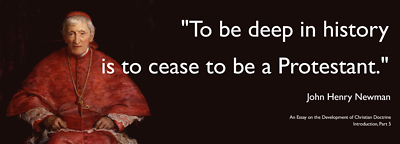Hmmm...very interesting. My post on your blog was not directed at Catholics but to any Baptists who were trying to sway your readers to believe otherwise. Roman Catholics, Lutherans, and Eastern Orthodox Christians stand together on the crucial issue of baptismal regeneration.
Lutherans and Roman Catholics actually have much more in common than Lutherans and other Protestants. We believe in baptismal regeneration. We believe that Jesus Christ is truly present, body and spirit, in the bread and wine of the Holy Sacrament of the Lord's Supper. We believe that sins are forgiven in the Sacrament. We are the only Protestants who hold these two "catholic" doctrines.
We Lutherans consider ourselves Catholic, just not Roman Catholic.Lutherans are in many ways halfway between Catholics and the bulk of protestants. They are much more sacramental than most protestants. I don't actually know how they believe what they believe about baptism, Eucharist, and apparently also confession and square it with a denial of the sacramental priesthood. If sacraments do real things then the person who performs these sacraments has real power. Not just anyone can have that power. There needs to be some group that will understands and respect this power. Anyway that is a big topic that is discussed at length by Tim Troutman. but it always seemed to flow for me that to have sacraments you needs priesthood and then you need some way to ordain priests. The dominoes start falling and you end up with at Catholicism.
So how are we different?The different forms of Sola Scriptura don't matter that much. They all boil down to yourself as the real final authority. Any time there are competing opinions on what the bible says there is nothing but your own preference to decide between the two. The opinion of the church is respected but can be discarded. Same with historical Christianity, we respect the early church fathers but they can be wrong. So there is no mind higher than my own in discerning God's truth.
Lutherans do NOT believe that "sola scriptura" means that the Bible is the only authority on Christian doctrine. However, unlike Roman Catholics we believe that the Bible is the only FINAL authority. Church Councils and bishops certainly are valuable authorities. But the pope and Church Councils are not EQUAL authorities to Scripture.
Just reading the quote on the graphic above you can get the egocentric nature of it. Unless I am convinced. I stand as the judge. What is scriptural? I will decide. What counts as plain and clear reasons and arguments? I will tell you. I am in the center.
Look at the early Christian Church in the first 300 years after Christ. The bishop of Rome had no higher status than the bishop of Antioch or the bishop of Alexandria. No bishop placed his word as equal to God's Word.I don't think so.You had St Cyprian talking about the chair of Peter around 250. He is the main one but Tertullian makes some statements as well. In the second century you have Irenaeus talking about succession of the bishop of Rome. Earlier you have the Corinthian controversy where they went to Clement, the bishop of Rome, to resolve their dispute. Even Paul in Rom 1:8 talks about how the faith of Rome is proclaimed in all the world. (Update: David Anders has something on this too.)
The bishop of Rome gained power and influence once Christianity was made the official religion of the Roman Empire. Then with the fall of the Eastern Byzantine Empire, the eastern bishops lost influence, while the power of the bishop of Rome increased to the point that he ruled essentially as a secular ruler.I am not sure what your point is. The fact that political forces were involved in establishing the primacy of Rome does not mean it is not God's will. The question is more whether the petrine office should have succession. That is, did the blessing Jesus gave to Peter in Mat 16:17-19 continue after Peter died? If the chair of Peter continues to be something Christians should respect then that means Rome.
The early Church Fathers say NOTHING about the bishop of Rome having authority over the entire Christian Church!The exact way the primacy of Peter is exercised would change over time. Local bishops ruled. They did so in unity with the bishop of Rome. Councils were important and the pope played a special role there. Still almost all decisions were made by the local bishop without and input from Rome. That is not the question. The question is did they see the papacy as a legitimate office? They did. If you accept that then when popes change the way they govern the church you will accept that too. That is what governance looks like. Dramatic structural changes can be made. They may or may not be prudent. But the grace of the office remains intact.
The idea that the bishop of Rome is the "vicar" of Christ on earth, possessing not only total control over the entire (western) Church but total civil control also brought the West in the sixteenth century such corruption and vice equal to any brothel or criminal mob.The notion of the vicar of Christ did not bring corruption. The church has always had the potential for corruption even at the highest levels. Lutheran churches have this problem too. It is called sin. It did not show up in the 16th century. The 200 years just prior to the reformation was a time where it was particularly bad for an extended period. There were anti-popes. There were inappropriate alliances between France and the pope with the papacy actually moving to France for a while. That tested the faith of Catholics especially in England and Germany who were political enemies of France.
Still the graces of the papacy remained intact. The church was in desperate need of reform in its practice. Its doctrine remained true. Its sacraments remained valid. Its role remained legitimate.
Martin Luther, a devout Catholic, was appalled by what he saw on his visit to Rome. He was even more appalled when Pope Leo X sent his emissaries to Germany to raise money to build St. Peter's by telling people that they good buy an indulgence, which would absolve them, or a loved one, of the temporal punishment of sins (decreased time in Purgatory).You don't buy an indulgence. You get one for doing some penitential act. The traditional penitential acts are prayer, fasting, and alms-giving. Now one can see that in the case of alms-giving people might be confused into thinking they are buying an indulgence because they give up money and receiving an indulgence. Tetzel actually added to this confusion because he saw that doing so added to the amount of money he collected. So bad theology was taught for bad reasons and the pope did nothing to stop it for the same bad reason, namely money.
This goes back to the earlier topic of corruption. Popes can make bad decisions. That does not invalidate the entire papacy. In fact, authority only becomes real when a decision is made that we don't like or even respect.Obeying authority that we agree with is hardly obedience at all.
Luther spoke out against abuse and corruption. Did the pope heed his advice, and "clean house" in the Church? No, he excommunicated Luther, and along with him, other devout Catholics, seeking a return to the faith of the Early Church.It was a bit more complicated than that. Luther could have stayed. He would have had to agree to stop teaching his views. He had quite a few fairly radical things he wanted changed about the church. He was right about some of them. The trouble was that he was sure he was right about everything and was not willing to be charitable about it.
Did Pope Leo handle it well? I don't think so. I think both men handled themselves more like school children than like clergy should. Lots of crude insults. More anger than substance.
That is why the Lutheran Church exists today. We did not leave the Holy Mother Church. We were kicked out my corrupt, immoral Churchmen.At the end of the day the pope is still the pope. Luther was too proud to recognize that. It is a hard thing. Church history has many examples of people being punished for disagreeing with the church and some of the time the church was eventually see to be wrong. That is what Luther need to do. Trust God that He will protect the church. He will root out error in the church. We just need to worry about rooting out error in ourselves.
The Church you know today as the Roman Catholic Church today, is not the same Church as it was in the days of Luther. It soon saw that if it did not want to lose all of Northern Europe it would have to clean up its act, thus the Council of Trent.The church did reform. Luther could have helped reform it from within. He chose not to so the reform took a little longer. God was faithful but Luther was not patient enough.
And by the way, the Pope and conservative Lutherans have so much in common that talks have begun on reconciliation. The Pope has lost hope in the liberal Protestants.I am the same way. I have more hope for conservative protestants. They actually believe in solid truth that does not change. What they don't realize is that when you define that precisely what truths Christians can question and what truths they must accept on faith you end up with very Catholic thinking.







